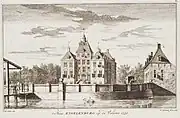Jacob Bicker
Jacob Bicker (Amsterdam 1588–1647) was a Dutch patrician and merchant. Between 1643 and 1647 he was lord of Engelenburg and a director of the Oostzeevaart, handling Dutch trade with the Baltic Sea.[1]

Life
Bicker Family


The Bicker family was one of the oldest patrician families of Amsterdam and belonged to the leading regent-oligarchy. They were a major trading family involved in the pelt trade with Muscovy and supplying ships and silver to Spain. The Bickers were the most powerful family in Amsterdam and decisively determined the fortunes of the city.[2][3] The Bicker-De Graeff family-faction became the strongest competitor in the years after the Dutch uprising. They controlled Amsterdam's city government and the province of Holland for half a century. Both families were powerful and influential between the earlier 17th century and the Rampjaar 1672 during the height of the Republic's power.[4] Through their work on the Amsterdam City Council and the Dutch East India Company, the Bickers gained enormous influence on politico-economic self-determination in the young Dutch Republic due to the city's position of economic power within the Republic.[5] Jacob Bicker was a son of Gerrit Bicker and Aleyd Andriesdr Boelens Loen.[6] Gerrit was a wealthy patrician, politician (burgomaster in 1603), international grain merchant and beer brewer.[7] and threw his work in the Amsterdam Vroedschap and as one of the founders of the East India Company, he was able to launch the careers of his sons, grandchildren and nephews. Jacob's oldest brother Andries Bicker ruled the city administration for a long time and was mainly supported and carried by him and their other two brothers Cornelis and Jan Bicker, his uncle Jacob Dircksz de Graeff and his cousin Cornelis de Graeff.[5] The Bicker brothers had a firm grip on world trade, trading on the East, the West, the North and the Mediterranean. Jacob's uncle Laurens Bicker was one of the first to trade on Guinea and seized four Portuguese ships in 1604.
Jacob Bicker married his cousin Christina de Graeff (1609–1679), daughter of Jacob Dircksz de Graeff and of Aaltje Boelens Loen.[8]
Career
Jacob Bicker was one of the richest people of the Dutch Golden Age and was estimated to have a fortune of 220,000 guilders in 1631.[9] In 1643 Jacob Bicker inherited the castle and estate of Engelenburg near Herwijnen from his relative Pieter Dircksz Graeff.[10] In the 1640s Jacob Bicker belonged to the Bickerse ligue, which opposed Stadholder Frederick Henry, Prince of Orange.[11] Among his other posts, he held that of Schepen of Amsterdam. In 1647 he died in Amsterdam, shortly before the death of his brother Andries Bicker.
Besides some lands in 's-Graveland and Gooilust, Bicker also owned country houses in Baarn, Soest, Bilthoven and Hollandsche Rading buitenhuizen: 'De Eult', 'Pijnenburg', Gooilust[12] and Kasteel de Hooge Vuursche.[13]
References
- De 500 Rijksten van de Republiek: Rijkdom, geloof, macht en cultuur, by Kees Zandvliet, p 29
- Seefahrer in schwedischen Diensten: Seeschifffahrt und Technologietransfer im 17. Jahrhundert, by Hielke van Nieuwenhuize, p 232 (2022)
- Geschichte der Niederlande: Von der Seemacht zum Trendland, by Christoph Driessen (2022)
- (in Dutch) Biography of Andries Bicker on DBNL
- Familial State: Ruling Families and Merchant Capitalism in Early Modern Europe, by Julia Adams, p 99 (2005)
- Johan Engelbert Elias, De Vroedschap van Amsterdam, 1578-1795, Deel 1, p 175
- Abraham Jacob van der Aa, Biographisch Woordenboek der Nederlanden (BWN), (1878), volume 1-2, p 517
- De Nederlandsche leeuw: Maandblad van het Koninklijk ..., Bände 1895-1900, "Genealogie van het geslacht de Graeff", p 134
- De 500 Rijksten van de Republiek: Rijkdom, geloof, macht en cultuur, by Kees Zandvliet, p 29
- Buitenplaatsen in de Gouden Eeuw: De rijkdom van het buitenleven in de Republik. By Y. Kuiper, Ben Olde Meierink, Elyze Storms-Smeets, p 75
- Amsterdam historisch: een stadsgeschiedenis aan de hand van de collectie van het Amsterdams Historisch Museum, by Marija Carasso-Kok, p 87 (1975)
- Buitenplaatsen in de Gouden Eeuw: De rijkdom van het buitenleven in de Republik. By Y. Kuiper, Ben Olde Meierink, Elyze Storms-Smeets, p 75
- Buitenplaatsen in de Gouden Eeuw: De rijkdom van het buitenleven in de Republik. By Y. Kuiper, Ben Olde Meierink, Elyze Storms-Smeets, p 77
Sources
- (in Dutch) Zandvliet, Kees, De 250 rijksten van de Gouden Eeuw. Kapitaal, macht, familie en levensstijl (2006 Amsterdam; Nieuw Amsterdam Uitgevers), p. 73
- (in Dutch) Engelenburg in de Ebidat – Burgendatenbank des Europäischen Burgeninstitutes